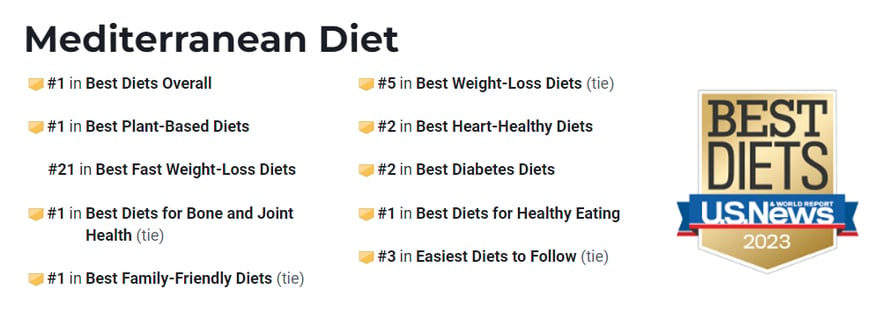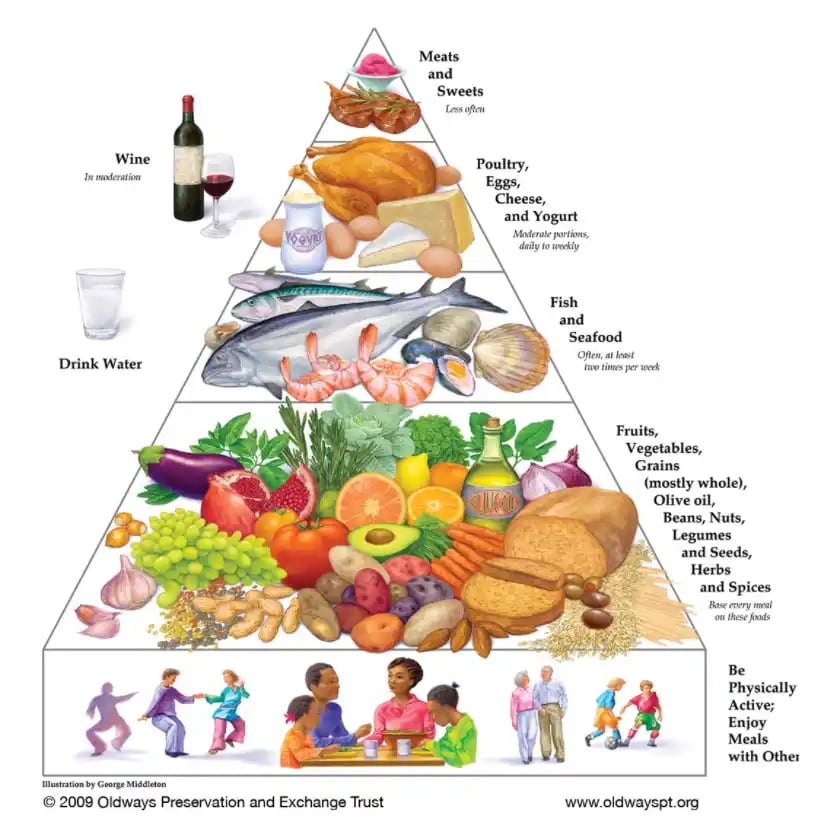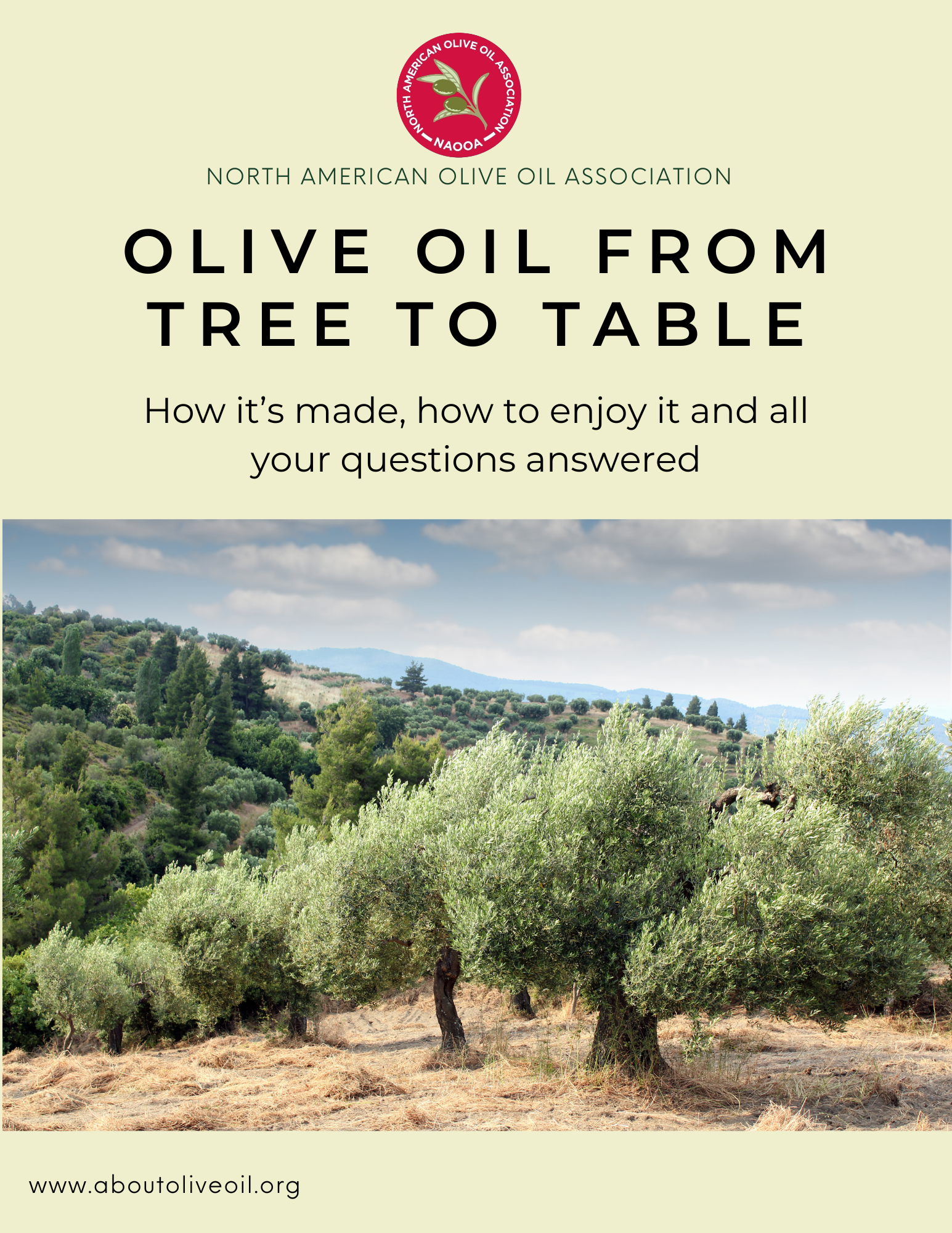The Mediterranean Diet has once again topped the list of best diets in the world, as ranked by US News & World Report. Experts also rated the Med diet #1 in 5 additional categories, including the best family-friendly diet, the best diet for bone and joint health, and the best plant-based diet.

Easy to Follow
The Mediterranean diet doesn't prohibit any foods; you do not need to keep track of or measure macros or calories. The below graphic shows how to follow the diet. Focus on making fruits, vegetables, whole grains, beans, nuts, legumes, and olive oil the base of the diet. Eat fish or seafood twice a week and eggs, cheese, and yogurt in moderation. A glass of red wine, in moderation, is allowed.
“It’s one of a small number of diets that has research to back it up,” said Dr. Sean Heffron, a preventive cardiologist at NYU Langone Health. “It isn’t a diet that was cooked up in the mind of some person to generate money. It’s something that was developed over time, by millions of people, because it actually tastes good. And it just happens to be healthy.”[1]
You do not need to buy special foods to follow the Mediterranean. Keep pantry staples like olive oil, canned tomatoes and tuna, whole grains, beans, and legumes on hand. Shop for fresh produce and seafood, and you are will be all set!

Health Benefits
The health benefits of the Mediterranean diet include:
- Heart health
A study found that those who followed the Mediterranean diet most closely for up to 12 years had about a 25 percent reduced risk of developing cardiovascular disease[2] - Protection from cancer
The Mediterranean diet can help prevent oxidative stress, which can cause DNA damage that contributes to cancer. [3] - Metabolic health
The Mediterranean diet can help reduce the risk of developing type 2 diabetes. [4] - Benefits during pregnancy
Those who followed the Mediterranean diet most closely around the time they conceived and during early pregnancy had about a 21 percent reduced risk of any pregnancy complications, such as pre-eclampsia, gestational diabetes or preterm birth. [5] - Protects brain function
Several studies show that the Mediterranean diet could be beneficial for brain health and may even protect against cognitive decline as you get older.[6]
Not a Low-Fat Diet
According to the experts at US News & World Report, the type of fat in a diet matters more than the total fat intake. The Mediterranean diet is full of heart-healthy, unsaturated fats, which come from olive oil.
Despite the fact that the Mediterranean is relatively high in fat, it is rated as a top choice for those who would like to lose weight. This has been confirmed in a recent study. Marta Guasch-Ferre, Ph.D. of the Harvard T.S. Chan School of Public Health, assures that "no scientific evidence supports the notion that eating more olive oil is associated with weight gain." [7]
Family-friendly
Since the Mediterranean Diet does not focus on eliminating foods or food groups (other than replacing less healthy fats with delicious olive oil), adherents find it much easier to stick to. Plus, the food options are healthy and enjoyable for your entire family.
Plant-forward and Sustainable
The base of the Mediterranean diet includes legumes, nuts, and seeds; these plant-based proteins make you feel sated longer and help quash cravings. Meats are allowed on the diet, but most of the proteins come from sustainable, plant-based sources.
Olive oil is used liberally in the Mediterranean diet. In addition to being good for your health, olive oil is also good for our planet. Olive oil is the most sustainable cooking oil on the planet. It's is non-GMO, water-wise, and olive trees (the world's largest permanent crop) act as a carbon-sink. According to the IOC, the worldwide olive oil industry absorbs the emissions of a city of around 9 million people.
How to Get Started
Want to get started eating the Mediterranean way? Here are some resources
- Browse the recipes on our website.
We offer dozens of delicious recipes that make the best use of olive oil. - Try the 4-Week Mediterranean Diet program offered by Oldways.
You can download a free 28-page menu plan book and for support, join their Facebook group. - The Culinary Institute of America also provides an excellent guide on incorporating olive oil into a plant-forward diet.
- EatingWell offers a 30-Day Mediterranean Diet Plan for Beginners. The guide includes menus and recipes.
- Everyday Health offers a 14-Day Meal Plan and a helpful list of foods to include in the diet
- Good Housekeeping offers a meal plan for beginners that includes a visual guide of what to eat for breakfast, lunch and dinner.
[1] NY Times
[3] Health Benefits of the Mediterranean Diet: Metabolic and Molecular Mechanisms
[4] Mediterranean diet for type 2 diabetes: cardiometabolic benefits
[5] Association of a Mediterranean Diet Pattern With Adverse Pregnancy Outcomes Among US Women
[7] cnn.com

.jpg)



